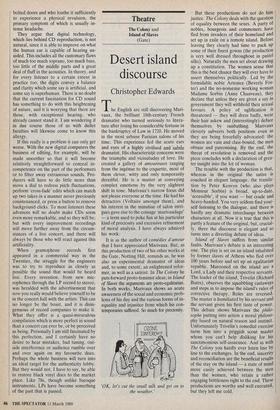Theatre
The Colony and Island of Slaves (Gate)
Desert island discourse
Christopher Edwards
The English are still discOvering Mari- vaux, the brilliant 18th-century French dramatist who turned seriously to litera ture after losing his considerable fortune in the bankruptcy of Law in 1720. He moved in the most urbane Parisian salons of his time. This experience fed the acute ears and eyes of a highly civilised and -subtle dramatist, His characteristic concerns were the triumphs and vicissitudes of love. He created a gallery of amoureuses ranging from the ingenue to the coquette, Most of them clever, witty and only temporarily deceitful. He is a master at conveying complex emotions by the very slightest shift in tone. Marivaux's narrow focus did not please everyone at the time. He had his detractors (Voltaire amongst them), and his interest. in the minutiae of salon intri- gues gave rise to the coinage `marivaudage — a term used to poke fun at his particular kind of preciosity and excessive refinement of moral analysis. I have always admired his work: It is as the author of comedies d'amour that I have appreciated Marivaux. But, as this Production of two of his other works at the Gate, Notting Hill, reminds us, he was also an experimental dramatist of ideas and, to some extent, an enlightened refor- mer, as well as a satirist. In The Colony he puts forward proto-feminist ideas; in Island of Slaves the arguments are proto-egalitarian. In 'both works, Marivaux shows an acute awareness of the social and economic prob- lems of his day and the various forms of in- equality and injustice from which his con- temporaries suffered. So much for preciosity.
'OK, let's cut the small talk and get on to the weather.' But these productions do not do him justice. The Colony deals with the question of equality between the sexes. A party of nobles, bourgeois and commoners have fled from invaders of their homeland and set up in exile on a remote island. Before leaving they clearly had time to pack tiP some of their finest gowns (the production is very well dressed throughout in pastel silks). Naturally the men set about drawing up a constitution. The women sense that this is the best chance they will ever have to assert themselves politically. Led by the formidable noble Artenice (Beverly Fos- ter) and the no-nonsense working woman Madame Sorbin (Anne Chauveau), they declare that' unless they are given a say in government they will withhold their Sexual favours. A policy of uglification iS threatened -- they will dress badly, wear their hair askew and (interestingly) deface themselves,, by sunbathing. Marivaux cleverly subverts both Positions even as they are being forcefully advocated: the women are vain and class-bound, the men obtuSe and 'patronising. By the end, the threat of revolution 'is removed and the piece concludes with a declaration of.grea- ter insight into the lot Of woman. The trouble with the production is that, whereas in the original the satire is couched in elegant langtiage,. the transli- tion by Peter Kenvyn (who also plays Monseur Sorbin) is broad', up-to-date, 'accessible', if you want — but crude and heavy-handed. You very seldom find your- self. listening to ,the dialogue, and there 15 hardly; any dramatic interchange between characters at all. Now it is true that this is partly a feature of the original,'but, crucial- ly, there the discourse is elegant and so turns into a diverting debate Of ideas, Island of Slaves suffers from similar faults. Marivatix's debate is an interesting one. The play is set on an island inhabited by former Slaves of Athens who fled over 100 years before and set up an egalitarian republic. Marooned on the island are a Lord, a Lady and their respective servants. The leader of the island, Trivelin (Richard Bates), observes the squabbling castaways and steps in to impose the island's rules of corrective therapy. lb:4es are reversed. The master is humiliated by his servant and the' servant given his first taste of power. This debate shows Marivaux the philo- sophe putting into action a moral philoso- phy based on natural reason and instinct. Unfortunately Trivelin's remedial exercise turns him into a priggish scout master whom you can't help disliking for his sanctimonious self-assurance. And as with The Colony you hardly ever listen line by line tb the exchanges. In the end, sincerity and reconciliation are the beneficial results of the stay on the island — a state of mind more easily achieved between the men than the women, who retain a rather engaging brittleness right to the end. These productions are worthy and well executed, but they left me 'cold.


























































 Previous page
Previous page